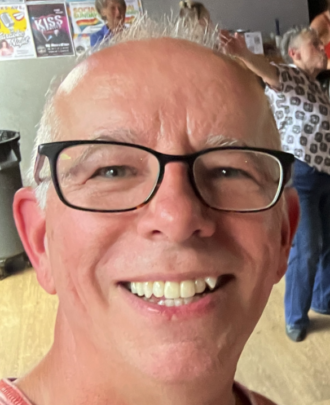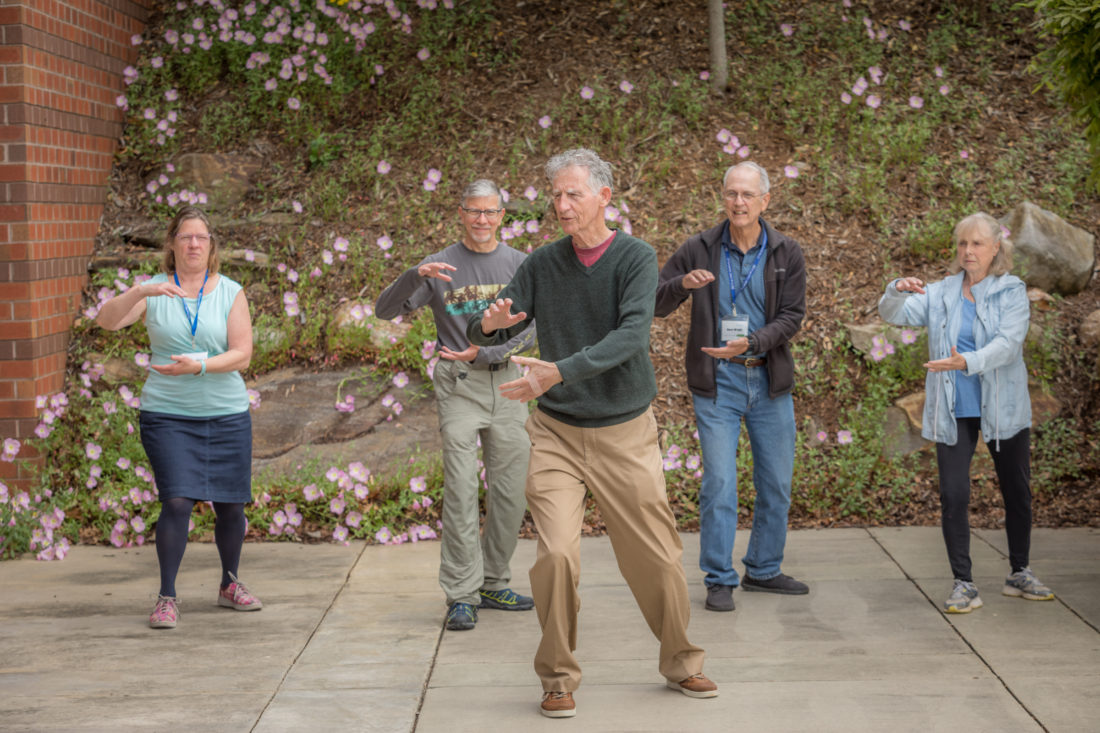A few weeks after Paul Heaton retired to West Asheville in May, he saw a sign at Banks Ave. Bar that grabbed his attention.
“It was for an event they described as ‘inclusive country-western dancing,'” says Heaton, who moved to the area after working in Washington, D.C., for 12 years. “I was looking for activities that would get me in touch with people in the gay community, so I went.”
Heaton got to know the organizers of Butts & Boots AVL and soon became a regular at the weekly line-dancing and two-stepping event.
“That’s how I’ve met most of the people I know in Asheville,” he says. “It’s very friendly, it’s men, it’s women, it’s gay, it’s straight, it’s just people who want to come and have fun. As I’ve gone to other things around town, I run into people who I met there. It’s been a wonderful introduction.”
Western North Carolina has long been a popular destination for retirees. Forbes.com and Money.com both listed Asheville among the best places in the country to retire in recent years, for instance.
But finding a sense of community and purpose can be a challenge for folks who are no longer working and have no ties to the area. Recent retirees and experts agree Heaton’s direct approach, while intimidating to some, is the best way to start meeting people.
“You have to be brave enough to do a few things by yourself,” says Catherine Frank, executive director of the Osher Lifelong Learning Institute at UNC Asheville. “You do have to take some of those first steps and recognize that it probably feels a lot like middle school when you weren’t getting picked for the team. But there are other people out there who absolutely are also looking for that community.”
Retirees told Xpress they have made connections in a variety of ways, from social media sites like Facebook and Meetup to neighborhood breweries, fitness centers and volunteer organizations. But they admit it isn’t always easy and takes persistence to find your people.
If at first you don’t succeed
While Heaton was able to connect with a group of like-minded people within a few weeks of moving to Asheville, others found the process took longer.
Shoshana Avree arrived in town from Florida during the early days of the pandemic in 2020 after retiring from her work as a massage therapist.
“I wouldn’t say it’s been supereasy to find community,” she says. “I was sequestered in my trailer like everybody else for a couple of years. It was like I was a hermit. I thought after a while I was going to go cuckoo if I didn’t find something to do.”
After trying a few other things, she says she recently found her “tribe” by getting involved with the local pottery community. An experienced potter, she became a member of Odyssey ClayWorks in the River Arts District, where she creates and sells works and does a monthly demonstration.
“That has brought my life to a really wonderful place of meeting other artists and having community,” she says. “I had to look around, but it finally all happened somehow.”
OLLI’s Frank says that kind of persistence and patience can be key to finding community for many retired people. She recommends saying yes to a variety of activities for a year or so before becoming more selective.
That was the approach Bruce Johnson and Cynthia Llanes took when they retired to Asheville from Southern California in 2017.

The married couple plunged right in, signing up for the Asheville Astronomy Club, the Sierra Club, MountainTrue and the Pisgah Conservancy. Llanes hosted a tea party for neighbors, created a Meetup group to teach painting and joined local arts groups. They also met people through Meetup hiking groups.
Llanes now displays her oil and acrylic paintings at New Morning Gallery in Biltmore Village and has gotten to know people in the arts community. Johnson volunteers at the Charles George VA Medical Center, teaching songwriting and music production.
“It took us at least five years to really acclimate completely and build community here,” Llanes says.
Adds her husband: “I think the West Coast is very easygoing, and people just like to get you involved. But when we moved here, I found you have to get out there to introduce yourself and to say, ‘I’d like to be part of the community.'”
Valerie Owen and her husband, Jim, moved to Swanannoa from Chicago at the beginning of the pandemic. Owen is an Asheville native but hadn’t lived in the area for 50 years before moving back and found the lack of community ties made things difficult.
“Our godsend has been the Black Mountain YMCA,” she says. “We joined in the early fall of 2020. They had just opened the building to classes and the gym floor. The daytime is full of retirees. I met people in the pool and classes. Many of those people are now friends.”
Leonora Reiley and her husband, John, have split time between Waynesville and York, Va., since John retired in 2022. Reiley met people through a Waynesville women’s group she found on Facebook, and her husband has become a regular at Frog Level Brewing Co. in downtown Waynesville.
“It seems like I have more friends that I do things with there than I do in Virginia,” she says.
She says they have been impressed with how friendly people are in the area.
“When I go down to, say, Maggie Valley to shop, then I need to allot myself an extra hour because I’m going to end up talking to somebody I’ve never met for a long time,” Reiley says. “There’s not that kind of distrust you have of people in other parts of the country.”
Heaton has had similar experiences.
“The thing I find that’s very different about Asheville is if you’re sitting in a bar or restaurant, the person sitting next to you talks to you,” he says. “And in D. C., that might happen, but usually one of the very first things you’ll talk about is what you do. ‘Are you in the government? Are you in the military? Are you a lobbyist?’ And it’s so refreshing that that’s not what people talk about here.”
Identity crisis
Making social connections is important for retirees, but finding meaning outside the workplace can be equally vital.
“It was hard not just for me, but for a lot of people that I knew my age,” Avree says. “We’re like, ‘OK, what’s going to be our purpose?’ I want to be of service to the community. That’s kind of what I do.”
That’s a sentiment OLLI’s Frank has heard from many of her organization’s members over the years. OLLI offers a program called Paths to Creative Retirement.
“The biggest thing we find that people want to know more about is, ‘Who am I when I’m not a title on a business card? What’s my identity?'” OLLI’s Frank says. “A lot of people, especially early in retirement, are looking for a sense of purpose.”
Encouraging service in the community is one of the goals of OLLI, which was founded in 1988 to “enable members to thrive in life’s second half.” The organization offers numerous volunteer opportunities, including serving on its advisory council and teaching in its College for Seniors, which offers more than 300 courses.
“The more people get engaged in helping making things better here for themselves and their peers, the more engaged and connected and really just happy many of them feel,” Frank says. “And a lot of people say that just having a class or an event or a meeting to go to gives them a sense of schedule that they miss when they don’t have work anymore.”
Heaton agrees that having regular events, such as Butts & Boots AVL, built into your schedule is important.
“It was so serendipitous that I showed up the week before (Butts & Boots AVL) started and met the organizers,” he says. “And so, I actually now work the door at this event welcoming people. If I hadn’t found this dance community, I think my introduction to Asheville would have been very different.”




Before you comment
The comments section is here to provide a platform for civil dialogue on the issues we face together as a local community. Xpress is committed to offering this platform for all voices, but when the tone of the discussion gets nasty or strays off topic, we believe many people choose not to participate. Xpress editors are determined to moderate comments to ensure a constructive interchange is maintained. All comments judged not to be in keeping with the spirit of civil discourse will be removed and repeat violators will be banned. See here for our terms of service. Thank you for being part of this effort to promote respectful discussion.